In the end it felt as if it was written in the stars. Every 12 years South Africa have an unerring habit of winning World Cups and they have done so again, following up their triumphs of 1995 and 2007 with another prodigious display of power and might. In some ways this was an even more special achievement, certainly for anyone who has ever dreamed of a black Springbok captain lifting the Webb Ellis Cup.
The image of Siya Kolisi hoisting the golden trophy into the clear Japanese night sky is set to become as treasured a picture as that of Nelson Mandela congratulating Francois Pienaar in Johannesburg 24 years ago, transcending such minor details as the scoreline and the sense of English disappointment. There are inspirational stories of hope overcoming colossal odds and then, above all else, there is the tale of Kolisi, the sport-loving boy from the townships of Port Elizabeth who has conquered the world.
On the podium during the presentations Kolisi could be seen trying to persuade his coach and longtime mentor, Rassie Erasmus, to collect the trophy with him. Erasmus has done an extraordinary job of resurrecting a struggling team but there was as much chance of him allowing Kolisi to win that battle as England had of escaping the onrushing South African juggernaut once it started to rumble.
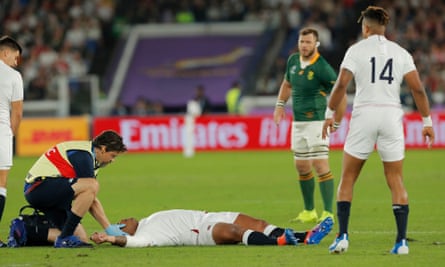
The Boks had a crestfallen England exactly where they wanted them long before two last-quarter tries from the wingers, Makazole Mapimpi and Cheslin Kolbe, settled a wincingly physical contest. Under massive scrum pressure and lacking the accuracy and front-foot dynamism that characterised their stunning semi-final win over New Zealand, there were only fleeting moments when England looked like emulating Martin Johnson’s champions of 2003.
They could have no complaints, even if the final margin was a touch inflated. South Africa fully deserved to become the second country, after the All Blacks, to win three World Cups and propelled by a dominant pack and 22 points from their fly-half Handré Pollard they also now have the distinction of becoming the first side to win a World Cup having lost a pool game en route, after meeting defeat in their opener to New Zealand.
Those predicting a comfortable England win were guilty of overlooking South Africa’s proud World Cup heritage. They had never previously fallen at the final hurdle nor conceded a try in their two previous finals. Both records remain intact. From the moment Kyle Sinckler was knocked out cold in the third minute following an accidental collision, England appeared trapped in the headlights, totally unable to gain the kind of gainline ascendancy that shocked New Zealand a week earlier.
Was it big-occasion nerves that undermined them or just the incessant pummelling they took from umpteen big South Africans? Either way, they were a pale shadow of the white tornadoes who tore through the All Blacks.
On a cool, windless evening the signs were ominous from the start. Pollard had already missed a long-range penalty before a shaken Sinckler was forced off. Barely had Dan Cole jogged on to replace him than England’s scrum was being shunted backwards, with Tendai “Beast” Mtawarira leading the charge.
When the Boks took the lead through a simple Pollard penalty in the 10th minute, after Owen Farrell had been caught in front of his own posts, it was well overdue.
Nothing was working for England. Passes fell to earth and uncertainty began to ripple through the team. Only when South Africa were slightly unluckily penalised after Pollard juggled a high ball and the subsequent catcher, Pieter-Steph du Toit, was adjudged offside, did England enjoy a momentary lull. Farrell chipped over an equalising penalty but a botched restart collection and yet more scrum pressure allowed Pollard to restore his side’s advantage.
A big tackle from Sam Underhill on Du Toit offered temporarily relief but, despite a prolonged period of advantage close to the Bok line, England could only come away with another Farrell penalty.
Again it provided a brief respite. Mapimpi robbed Elliot Daly in the air and with England again clinging on illegally on the floor Pollard made it 9-6.
England would definitely have settled for a three-point half-time deficit but another punishing scrum prompted Jérôme Garcès to extend his arm again. The excellent Pollard was wheeling away to the tunnel even before his fourth penalty had sailed between the uprights.
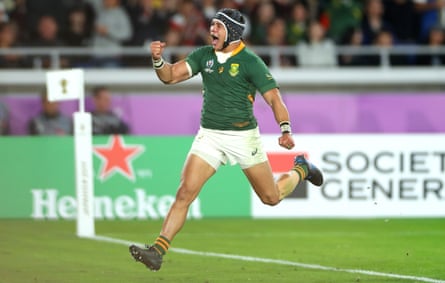
What could possibly turn the tide? The organisers opted to play John Denver’s Take Me Home, Country Roads that, for a moment or two, completely changed the vibe in the stadium. It felt almost like a heartfelt farewell appreciation to the tournament and 70,000 spectators, some of whom have been away for weeks, were suddenly united as one.
England, though, needed to break the spell out on the pitch. If they glimpsed a ray of hope when their chief tormentor Mtawarira and his fellow prop, Frans Malherbe, were replaced three minutes into the second half, it was merely the headlights of another onrushing train. Steven Kitshoff and Vincent Koch would make most starting XVs in the world and yet another scrum penalty allowed Pollard to make it 15-6.
Bringing on Joe Marler for Mako Vunipola, in the circumstances, was a no-brainer and the Harlequins loose-head made an immediate difference. Farrell drilled home a 46-metre penalty and should have had another when Pollard, attempting to jink his way out of defence, was tap-tackled by Anthony Watson and penalised for not releasing. It was a false dawn, with Lukhanyo Am unselfishly putting an exultant Mapimpi over and Kolbe leaving Farrell sprawling down the right touchline to complete the rout.
The dramatic final act was typical of a tournament that seldom disappointed. From the hot springs of Beppu to the backstreets of Tokyo there was something for everyone, entirely justifying the decision to stage the event in Asia for the first time. Japan have been exceptional hosts, consistently exceeding expectations on and off the field. Even for England’s disappointed players, the memories will last a lifetime.
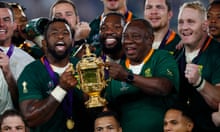
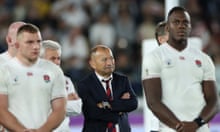






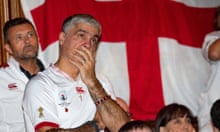

Comments (…)
Sign in or create your Guardian account to join the discussion